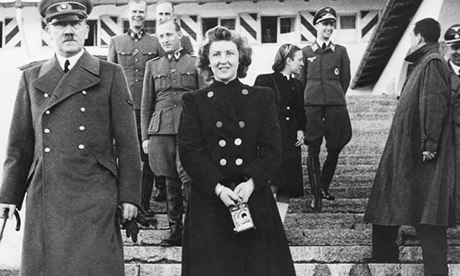The notorious claim that Hitler escaped his Berlin bunker to live incognito in Argentina first gained popular currency in 1945, when Stalin spoke of it. Since then the idea has resurfaced occasionally, with alleged photographic and documentary evidence pored over by conspiracy theorists. Now the theory that the German dictator followed his fellow Nazis Adolf Eichmann and Josef Mengele to South America is at the centre of a fresh row.
The authors of the 2011 book Grey Wolf: The Escape of Adolf Hitler, which was made into a documentary film earlier this year, have been accused of plagiarism by a journalist in Argentina. Abel Basti claims his research has been unfairly used to substantiate claims made in the book. Grey Wolf, published by Sterling Publishing, based in New York, challenged the accepted view that the Führer shot himself in his Berlin bunker on 30 April 1945 and that Eva Braun also committed suicide by taking cyanide. Arguing that American intelligence officials turned a blind eye to Hitler's escape in return for access to Nazi war technology, Gerrard Williams and Simon Dunstan set out the case for a scenario almost too horrible to contemplate: that the Führer and Eva Braun made a home in the foothills of the Andes and had two daughters.
Hitler, they claim, escaped punishment and lived out his life in tranquillity in Patagonia until his death in 1962 at the age of 73.
The publisher billed the book as the result "of five years of travelling and interviewing eyewitnesses and piecing together a mountain of evidence". Now Basti alleges that this is "a grossly misleading statement" and that Williams and Dunstan held on to evidence he had spent years putting together.
Williams, a British TV journalist who has worked for Reuters, the BBC and Sky News, and his co-author, Dunstan, firmly deny the claim.
"Basti did in no way invent the idea of Hitler being alive in Argentina," Williams told the Observer. "Books on the subject existed as far back as 1953 and 1987. I have never plagiarised anyone's work. Simon Dunstan, as the author of over 50 books on military history, hasn't either. We're both very aware of the law."
Williams travelled in 2007 to Argentina, where he acknowledges that he received help from Basti, along with other researchers and translators. Basti now claims that on seeing the book and hearing of the new film he realised that the work he had handed over to Williams for use on an earlier documentary film project had been plagiarised.
Basti says he signed a contract conferring all rights to his work to Williams's company in return for substantial payments to come. On this basis, he adds, he introduced Williams to two key witnesses in the case for Hitler's survival, a Jorge Colotto and Captain Manuel Monasterio.
Filming began in September 2008, but was cut short when financiers pulled out due to the worldwide financial crisis. Basti claims his contract was terminated and so asked for his research to be returned but says nothing was sent back.
Following publication of Grey Wolf, Basti says he was incensed to see that he had been quoted as regarding one photograph as proof of Hitler's survival. The book has also annoyed Ricardo D'Aloia, the editorial director of Ambito Financerio, the flagship newspaper of a group that had earlier published reports of Basti's research. D'Aloia is angered at the suggestion that he handed the authors video and potential evidence belonging to Basti.
Williams denies that he was introduced to key witnesses by Basti. He also denies D'Aloia's claims, which, he says, are "simply untrue". He adds that he "cannot see how quoting from taped interviews, thoroughly sourced to the company who made it implicitly clear that it was their material, is any sort of violation of copyright".
The claims about Hitler's life in exile in Argentina have been ridiculed by historian Guy Walters, who pronounced them "2,000% rubbish" when the book came out. "It's an absolute disgrace. There's no substance to it at all. It appeals to the deluded fantasies of conspiracy theorists and has no place whatsoever in historical research," he said.
http://www.theguardian.com/world/2013/oct/27/hitler-lived-1962-argentina-plagiarism/print


